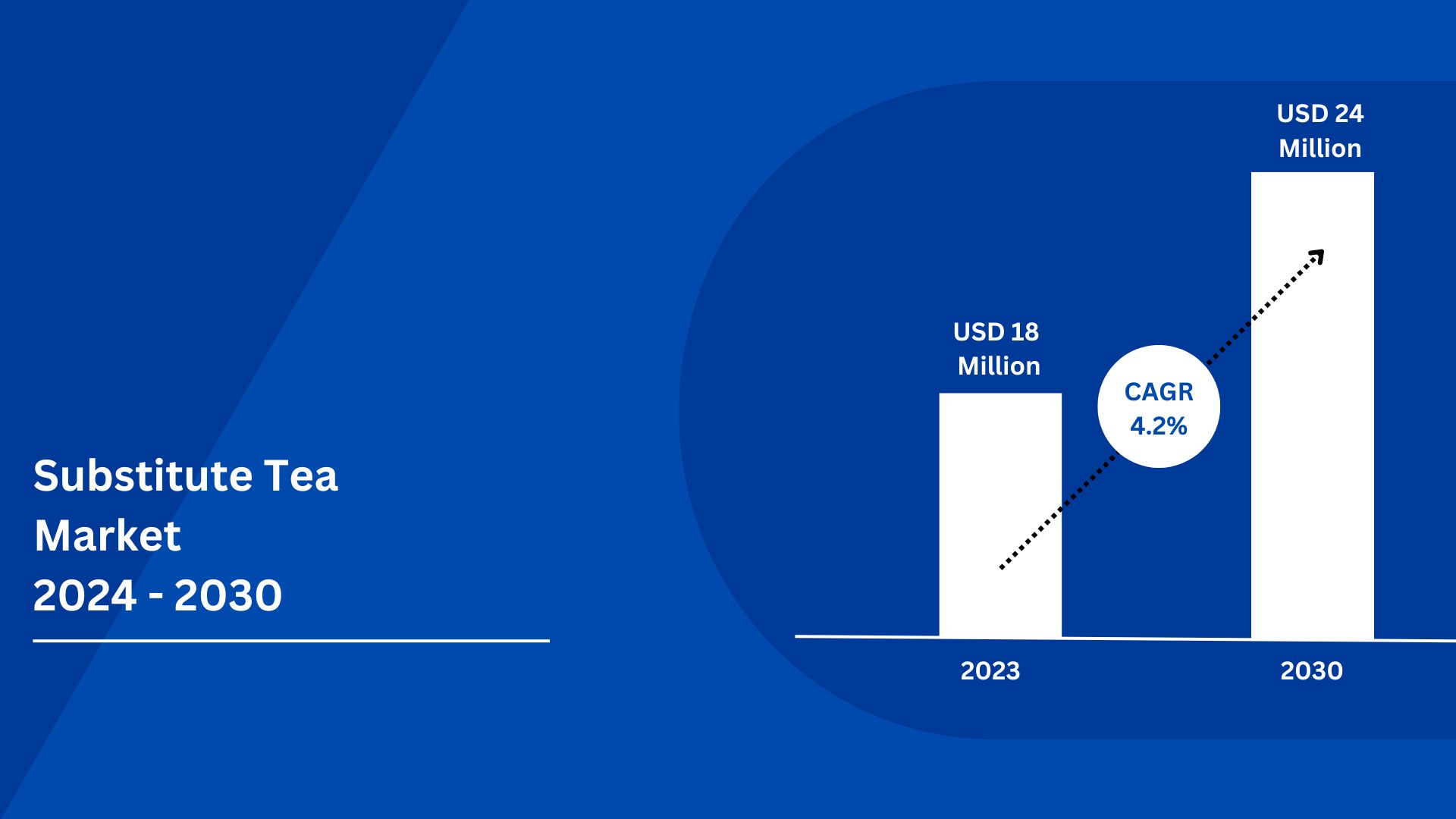The global Substitute Tea market was valued at USD 18 million in 2023 and is projected to reach USD 24 million by 2030, growing at a Compound Annual Growth Rate (CAGR) of 4.2% during the forecast period (2024-2030).
Market Expansion: The projected growth suggests an expanding market for Substitute Tea products, driven by factors such as changing consumer preferences and increasing awareness about health benefits associated with tea substitutes.
Regional Dynamics: The growth of the Substitute Tea market might vary across regions due to factors like cultural preferences, economic conditions, and regulatory frameworks. Understanding regional dynamics will be crucial for market players to capitalize on growth opportunities.
Innovation and Product Development: Market players are likely to invest in innovation and product development to meet evolving consumer demands and differentiate themselves in a competitive market landscape.
Health and Wellness Trends: Growing health and wellness trends, coupled with the rising popularity of natural and organic products, are expected to drive the demand for Substitute Tea as consumers seek healthier alternatives to traditional tea products.
Market Challenges: Despite growth prospects, the Substitute Tea market may face challenges such as changing agricultural conditions, supply chain disruptions, and fluctuations in raw material prices, which could impact market growth.
Market Segmentation: Market segmentation based on factors like product type, distribution channel, and region will be crucial for market players to tailor their strategies and effectively target specific consumer segments.
Sustainability and Ethical Sourcing: With increasing consumer awareness about sustainability and ethical sourcing practices, market players are likely to focus on offering environmentally friendly and responsibly sourced Substitute Tea products to meet consumer expectations and enhance brand reputation.

The U.S. Market is Estimated at $ Million in 2023, While China is Forecast to Reach $ Million.
Leaf Segment to Reach $ Million by 2030, with a % CAGR in next six years.
The global key manufacturers of Substitute Tea include Harney & Sons, China Tea, Sunflower, Bama Tea, Small Can Tea, Pu'er Lancang Ancient Tea, Colorful Yunnan King-shine Tea, OnCha and Baoxiang Tea, etc. in 2023, the global top five players have a share approximately % in terms of revenue.
Substitute tea refers to a class of products that use leaves, flowers, fruits (fruits), rhizomes, etc. of edible plants other than tea, and are consumed in a similar way to tea (drinking by brewing, boiling, etc.).
This report aims to provide a comprehensive presentation of the global market for Substitute Tea, with both quantitative and qualitative analysis, to help readers develop business/growth strategies, assess the market competitive situation, analyze their position in the current marketplace, and make informed business decisions regarding Substitute Tea. This report contains market size and forecasts of Substitute Tea in global, including the following market information:
- Global Substitute Tea Market Revenue, 2019-2024, 2025-2030, ($ millions)
- Global Substitute Tea Market Sales, 2019-2024, 2025-2030, (K Units)
- Global top five Substitute Tea companies in 2023 (%)
MARKET MONITOR GLOBAL, INC (MMG) has surveyed the Substitute Tea manufacturers, suppliers, distributors and industry experts on this industry, involving the sales, revenue, demand, price change, product type, recent development and plan, industry trends, drivers, challenges, obstacles, and potential risks.
Total Market by Segment:
Global Substitute Tea Market, by Type, 2019-2024, 2025-2030 ($ Millions) & (K Units)
Global Substitute Tea Market Segment Percentages, by Type, 2023 (%)
- Leaf
- Flowers
- Fruit
- Rhizome
- Mixed Class
Global Substitute Tea Market, by Sales Channels, 2019-2024, 2025-2030 ($ Millions) & (K Units)
Global Substitute Tea Market Segment Percentages, by Sales Channels, 2023 (%)
- Online Sales
- Offline Sales
Global Substitute Tea Market, By Region and Country, 2019-2024, 2025-2030 ($ Millions) & (K Units)
Global Substitute Tea Market Segment Percentages, By Region and Country, 2023 (%)
- North America (United States, Canada, Mexico)
- Europe (Germany, France, United Kingdom, Italy, Spain, Rest of Europe)
- Asia-Pacific (China, India, Japan, South Korea, Australia, Rest of APAC)
- The Middle East and Africa (Middle East, Africa)
- South and Central America (Brazil, Argentina, Rest of SCA)
Competitor Analysis
The report also provides analysis of leading market participants including:
- Key companies Substitute Tea revenues in global market, 2019-2024 (Estimated), ($ millions)
- Key companies Substitute Tea revenues share in global market, 2023 (%)
- Key companies Substitute Tea sales in global market, 2019-2024 (Estimated), (K Units)
- Key companies Substitute Tea sales share in global market, 2023 (%)
Further, the report presents profiles of competitors in the market, key players include:
- Harney & Sons
- China Tea
- Sunflower
- Bama Tea
- Small Can Tea
- Pu'er Lancang Ancient Tea
- Colorful Yunnan King-shine Tea
- OnCha
- Baoxiang Tea
- Guang Fu Tea
Outline of Major Chapters:
Chapter 1: Introduces the definition of Substitute Tea, market overview.
Chapter 2: Global Substitute Tea market size in revenue and volume.
Chapter 3: Detailed analysis of Substitute Tea manufacturers competitive landscape, price, sales and revenue market share, latest development plan, merger, and acquisition information, etc.
Chapter 4: Provides the analysis of various market segments by type, covering the market size and development potential of each market segment, to help readers find the blue ocean market in different market segments.
Chapter 5: Provides the analysis of various market segments by sales channels, covering the market size and development potential of each market segment, to help readers find the blue ocean market in different downstream markets.
Chapter 6: Sales of Substitute Tea in regional level and country level. It provides a quantitative analysis of the market size and development potential of each region and its main countries and introduces the market development, future development prospects, market space of each country in the world.
Chapter 7: Provides profiles of key players, introducing the basic situation of the main companies in the market in detail, including product sales, revenue, price, gross margin, product introduction, recent development, etc.
Chapter 8: Global Substitute Tea capacity by region & country.
Chapter 9: Introduces the market dynamics, latest developments of the market, the driving factors and restrictive factors of the market, the challenges and risks faced by manufacturers in the industry, and the analysis of relevant policies in the industry.
Chapter 10: Analysis of industrial chain, including the upstream and downstream of the industry.
Chapter 11: The main points and conclusions of the report.

